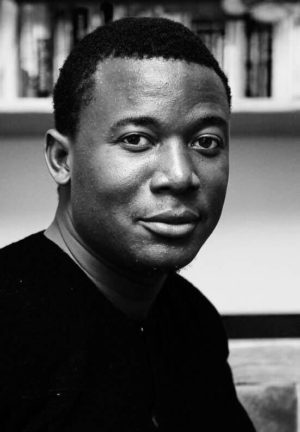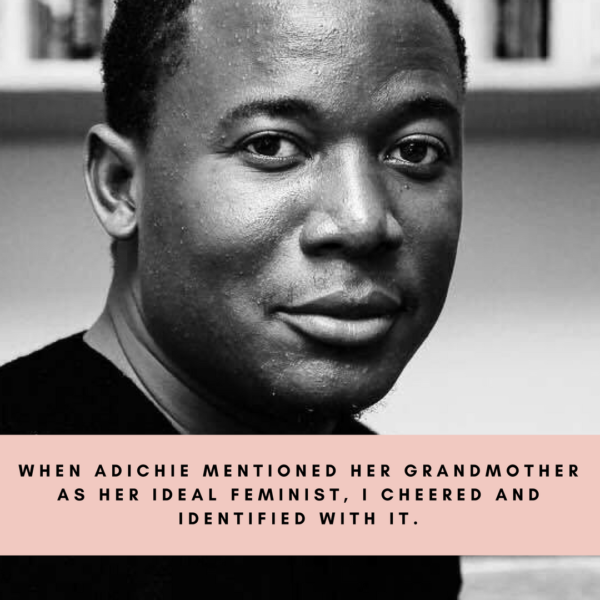When I was first asked to write this piece, the issues of the day included the trendy acceptance of feminism through Chimamanda Adichie’s delightful viral TED talk, the resulting print pamphlet that has achieved its own notable virality across Europe, and a high profile appearance of the author on the fashion red carpet. Also in the news was the seeming ideological disagreement between the author and Beyoncé Knowles through whose music she had been opened up to a new and diverse audience when it was featured in the latter’s penultimate album. I have a few thoughts on that particular ideological conflict and I’ll get to it in a moment, but as at 8pm today, Lagos time, a man by the name of Donald J. Trump had just been given a tour of the White House as the new president elect. And for that reason, this essay needed immediate retooling.
There are a number of reasons why the victory of a misogynistic demagogue would upset and offend us so. But for this particular piece on feminism, Trump’s win is significant for a different reason. It exemplifies the multi-dimensional framework of oppression and shows why minority groups in American society have had to take a dynamic approach to resisting oppression. For a start, please read this piece by Rembert Browne. Browne argues that if Trump’s populist poison is the outcome of a state of affairs where misogyny, racism, and other autocratic vices become too conjoined to defeat, any attempt to defeat any one of these and other vices may also need to incorporate each of the elements of different struggles in one hydra-headed weapon.
This brings me back to Beyoncé’s Lemonade album which seems to have been, among others, the primary irritant for Adichie’s recent controversial commentary.
***
I remember growing up in Ìbàdàn as the second boy among four sisters and realizing, quickly, that gender would never get me out of important house chores. My mother, who (like many others) would never refer to herself as a feminist, would usually respond — whenever gender role was used as an excuse to escape one’s responsibility — with a statement that was as jarring as it was weirdly appropriate: “Why do I need to know that you are a boy? Were you going to do the chore with your penis?” (or “girl/vagina” as the case may be). That usually shut up the offending child and raised giggles among nearby listeners.
So when Nigerian Adichie mentioned her grandmother as her ideal feminist, I cheered and identified with it. It may have sounded sacrilegious to the white liberals for whom the label “feminist” may refer only to a specific tradition, limited to a specific place (United States, the UK, etc.), but it didn’t matter. Adichie, thus, provides the grounds for making the case that women on this continent have fought for their own struggles of equality and leadership perhaps as long as Western ones have, but without the label that has now made it globally trendy. Call for awareness from across the pond of other ways, in other cultures, in which the challenge to the male privilege and superiority has taken place for many years.
I wish now that she didn’t then, later, delve into a definition of her own “type” of feminism in contrast with that of Beyoncé — the singer on whose album she had just recently been featured, and who has also been famously recognized as a face of feminism. Adichie bases her critique on the place of men within feminist discourse, criticizing Beyonce’s feminism for “giv[ing] quite a lot of space to the necessity of men.” “I think men are lovely,” Adichie remarks, “but I don’t think that women should relate everything they do to men: did he hurt me, do I forgive him, did he put a ring on my finger.”
To begin with, this critique seemed incongruous with the context Adichie’s earlier posturing to inclusivity and came off as though thumbing her nose at something she didn’t understand: another kind of localization of feminism in the African-American community tailored towards more than one equally relevant purpose. Racism against African-American people is one of these — a fight that has taken place for over hundreds of years. Because of the size, stature, and spread of the problem — the white (but also white male) establishment — the fight has had to be nimble and sometimes batched, incorporating weapons of feminism and other civil right tools. This, to Adichie’s consternation, includes men. But they’re not just men, they are black men. The “necessity of men” in Beyonce’s feminist discourse, therefore, has something to do with a long history of resistance that lies at the intersection of anti-racism and feminism.
Watching the returns of the election brought this, for me, into a sharper relief. For the first time in recent years, the white voting population “voted like a minority,” giving a majority of their votes to one candidate: the candidate that boasted of grabbing women’s privates without their permission; the one that took out a newspaper ad to condemn a couple of black youths for a crime they had been cleared of; the one that boasted of forcing himself on women because, as a celebrity, “they let you do it”; the one that wants there to be “some sort of punishment” for women who have abortions; the one who called a group of minorities “rapists” and “criminals”; and the same one who boasts of his anger “going through the roof” if his wife doesn’t have food on his table when he returns from work, among other misogynistic rants and behaviors.
For the first time in years, a majority of white voters, men and women, chose that man over another woman; voted for that man after a successful administration of the nation’s first black president. And a large number of that majority, perhaps the same that was anti-semitic, and racist, and liked the KKK, voted against the woman because “women shouldn’t run for president.” So if a white woman —- Hillary Rodham Clinton — could have faced that kind of an open and blatant sexism with a generous sprinkling of racism and other forms of violent rhetoric from other white women (and men), imagine how much more black women have had to fight to establish their dignity first as people of color and then as women. Then imagine why they’d think that according some space to their men in that struggle is as much a necessity as a bold thumbing of nose at the monster of the giant oppressive establishment, and not a minor coincidence or an expression of fickleness as was dismissively implied.
As I finally understood it, it would be the same as the fight for dignity as a woman in the Biafran enclave of the Nigerian Civil War. No account of that time, even by an author/artist whose primary focus is the empowerment of women, will deliberately forget to accord equal dignity to the men of that same time — even as tangential elements of a larger story. So where can one find a literary work of such complexity, depth, and value, about the Nigerian Civil War, but still with proper treatment of this “necessity” of relevant men to the furtherance of the story. Hmm. Help, Odenigbo! Help, Obinze!
As Adichie would expect Beyoncé’s understanding of the different ways in which African women (in Americanah or Half of a Yellow Sun — fantastic works of art that explore both feminist ideals against the background of heterosexual relationships) navigate or champion feminism in their own ways, sometimes away from labels, the writer was also expected to display that kind of respect for a different kind of struggle of the African-American communities within the American social and political systems. Yes, this manifests in love, and forgiveness, and betrayals, and all shades of “the necessity of men” in Beyoncé’s work, and that is fine too. The singer has, after all, shown that she can also take feminism out of art into real life.
“I think that anything that gets young people talking about feminism is a very good thing,”Adichie had said, helpfully, in an earlier interview. “I also think that I have a problem with the idea of feminism as being some sort of exclusive party that someone gets to decide whether you can come, and also the idea that somehow a woman who is comfortable with her sexuality, that there’s something wrong with that.” In the end, what was called for was an understanding of each other’s localized response to what was, undoubtedly, a universal struggle. Beyoncé’s feminism, because of its location and challenges, may not look the same way as Chimamanda’s from afar, and that’s alright.
***
It’s possible that I haven’t said much about my feminism in this piece. I attempted that in an earlier article. Being fully aware of the role of men in the oppression of women, in words and in deed, and even in the upholding of institutions that have historically oppressed them, I have tried to make sure that my contribution to the discourse is more practical than polemic. As the father of a three year-old son, the imperative is very strong to bring him up with respect for the equality of the genders, without any hangups from traditional patriarchal culture. The element of partisan politics around us makes it imperative that the response be also as intersectional. Melania Trump, for instance, is as deserving of dignity as a human being (and as FLOTUS) as any, in spite of her past as a nude model — no matter what the memes meant to shame her say.
I realized while watching Samantha Bee’s pre-election episode of Full Frontal that much of Hillary Clinton’s problem in public life in America had had something to do with Bill, her husband (and — if we add Anthony Weiner to the list — men in her life generally). She had, apparently, adopted the last name “Clinton” only after she got blamed for his first governorship election defeat in a highly conservative Arkansas in 1979. That is hugely significant, and sad in its own way, not in the least because now we can agree that Western “civilization” is anything but. However, exploring that complexity, in art and in protest, shouldn’t invite any such pejorative as “the necessity of men,” because — at the very least — men can (and should) be feminists, too.
*********
*Click HERE to learn more about the #MyFeminism essay series. If you enjoyed this essay, stop by on Wednesday November 30th to read Wana Udobang’s contribution to the conversation.
Read the first essay in the series —“Complicating the Significance of Gender” by Keside Anosike—HERE.
Read the second essay in the series —“The Unwomanly Feminist” by Pearl Osibu—HERE.
Read the fourth essay in the series — “Remembering to Scream” by Wana Udobang HERE.
**********
About the Author:
 Kọ́lá Túbọ̀sún writes from Lagos, Nigeria. He is the head lexicographer at YorubaName.com, and blogs at KTravula.com.
Kọ́lá Túbọ̀sún writes from Lagos, Nigeria. He is the head lexicographer at YorubaName.com, and blogs at KTravula.com.










Hannah November 30, 2016 06:27
"The element of partisan politics around us makes it imperative that the response be also as intersectional. Melania Trump, for instance, is as deserving of dignity as a human being (and as FLOTUS) as any, in spite of her past as a nude model — no matter what the memes meant to shame her say." I also thought the digging up of old pictures were kind of limiting. True, before now, Melania hasn't given us much stimulation intellectually, especially after that infamous speech she gave. Although comparing her to Michelle will be more of a disservice, that does not mean she has nothing to offer. But with Trump as husband and as president, going with all the 'symptoms' that have also been outlined here, one can only say to her, "Good luck", because she will need it. I don't think he married her for her intellect, and I hope she will be able to find a confident self apart from her husband as First Lady.